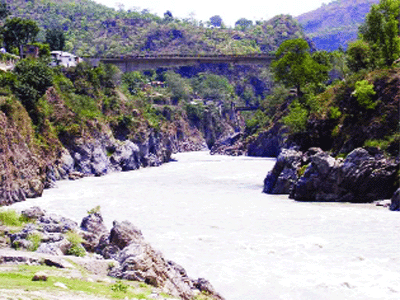Nobel laureate RK Pachauri wants subsidies for solar lanterns over kerosene and insists that the Ganga cannot relive its glory without the participation of all stakeholders. Karan Bhardwaj reports
It seems Ganga river has finally got acche din in her kitty. The spotlight on her cleanliness looks promising as the leader in charge for the task, Uma Bharti, has set three years to finish her agenda. On top of that, several experts and environment specialists are burning the midnight oil in presenting papers and devising techniques that could ultimately revive the glory of this sacred river. TERI students recently gave a presentation on the Ganga and also broadcast a movie bringing forth the plight of millions of Ganga followers and those making a living on the banks. TERI’s director general RK Pachauri, a nobel laureate, emphasised on the need of bhaagedaari (participatory approaches) in the process of Ganga revival. “Without involving the stakeholders including those who are living besides Ganga we cannot achieve the dream of a clean river. The task is possible as we have had successful examples in many foreign countries which not only flushed out the dirt from the streams but also infused a new life to the dried rivers,” he said.
Advocating the use of renewable energy in day-to-day life, Pachauri urged the government to cut the subsidy on kerosene and instead subsidise solar lanterns. “There is a huge subsidy on kerosene. But the same kerosene is used in adulterating petrol. The kerosene lamps have a very bad effect on health. Government should remove the subsidy on kerosene and perhaps give subsidy on solar lanterns instead,” Pachauri, the head of the UN’s Intergovernmental Panel on Climate Change (IPCC), said.
India’s rivers are polluted to an extent that does not allow any life to survive in them. The result is not only widespread economic loss but also the spread of disease on account of pollutants, toxic waste and disease carrying organisms being transported by our rivers.
Uma Bharti, union minister for Water Resources said, “We need to analyse why rivers, that were unpolluted for thousands of years, have suddenly become severely polluted during the past 40-50 years. Today, even animals cannot take a dip in the waters. We need a judicious mix of knowledge from global and national best practices to clean up our rivers, as it has happened in Sabarmati, Thames and the Rhine. The most important task is to ensure minimum biological flow of the river. Even treated water should not be allowed to flow into the river.” She further added, “We need a participatory approach from various stakeholders, including industries, to make cleaning the Ganga a success. The industry needs to realise that if rivers die, the industries would die too. It is easy to dwell on the problems but difficult to come up with solutions, or even to know where to start.”
























